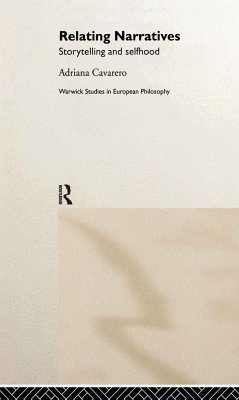Relating Narratives is a major new work by the philosopher and feminist thinker Adriana Cavarero. First published in Italian to widespread acclaim, Relating Narratives is a fascinating and challenging new account of the relationship between selfhood and narration. Drawing a diverse array of thinkers from both the philosophical and the literary tradition, from Sophocles and Homer to Hannah Arendt, Karen Blixen, Walter Benjamin and Borges, Adriana Cadarero's theory of the narratable self' shows how narrative models in philosophy and literature can open new ways of thinking about formation of human identities. By showing how each human being has a unique story that can be told about them, Adriana Cavarero inaugurates an important shift in thinking about subjectivity and identity which relies not upon categorical or discursive norms, but rather seeks to account for who' each one of us uniquely is.
'This is an important book, not least for the fruitful ways in which it brings two dominant modes of cognition in the West, philosophy and narrative, face to face with each other. And perhaps even more important for its joyous and antinomian rejection of what narrative has brought us, in interiority and all its burdens.' - Radical Philosophy
'This is an important book, not least for the fruitful ways in which it brings two dominant modes of cognition in the West, philosophy and narrative, face to face with each other. And perhaps even more important for its joyous and antinomian rejection of what narrative has brought us, in interiority and all its burdens.' - Radical Philosophy








